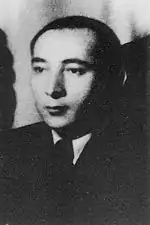Saifuddin Azizi
Saifuddin Azizi (Uighur: سەيپىدىن ئەزىزى; March 12, 1915 – November 24, 2003), also known as Seypidin Azizi, Saif al-Dīn ʿAzīz, Saifuding Aizezi and Saifuding, was the first chairman of the Xinjiang Uyghur Autonomous Region of the People's Republic of China.
| Saifuddin Azizi | |||||||||||
|---|---|---|---|---|---|---|---|---|---|---|---|
 Saifuddin Azizi in 1950 | |||||||||||
| Chinese name | |||||||||||
| Traditional Chinese | 賽福鼎·艾則孜 | ||||||||||
| Simplified Chinese | 赛福鼎·艾则孜 | ||||||||||
| |||||||||||
| Uyghur name | |||||||||||
| Uyghur | سەيپىدىن ئەزىزى | ||||||||||
| |||||||||||
Biography
Azizi was born in Tacheng to an influential Uyghur trader family originally from Artux (Artush).[1][2] He attended school in Xinjiang and then moved to the Soviet Union, joining the Communist Party of the Soviet Union (CPSU) and studying at the Central Asia Political Institute in Tashkent.[3] He returned to Xinjiang as a Soviet agent, instigating the Soviet-backed Ili Rebellion against the Republic of China government in northwest Xinjiang. He served as Minister of Education in the Second East Turkestan Republic and Commissioner of Education in the Zhang Zhizhong Ili Rebel-Kuomintang coalition government from 1945–1948.[1] In September 1949, Saifuddin attended the Chinese People's Political Consultative Conference endorsed by the Communist Party of China (CPC), becoming a member of the new Communist government.[4] In October, the 1949 Chinese revolution brought the Communists to power in Xinjiang and in China more generally; at this point, Saifuddin held various posts for Nationalities and Political and Legal Affairs for the new government.[1]
From December 1949 through January 1950, he accompanied Mao Zedong in his trip to Moscow to negotiate the Sino-Soviet Treaty of Friendship and it was there on December 27, 1949 where he quit the CPSU and joined the CPC in accordance with recommendation of Mao himself. In 1955, he registered with Mao his strong objection to proposals to name Xinjiang the "Xinjiang Autonomous Region", arguing that "autonomy is not given to mountains and rivers. It is given to particular nationalities". As a result, the administrative region would be named "Xinjiang Uyghur Autonomous Region".[5]
Uyghur linguist Ibrahim Muti'i opposed the Second East Turkestan Republic and was against the Ili Rebellion because it was backed by the Soviets and Stalin. Saifuddin Azizi later apologized to Ibrahim and admitted that his opposition to the East Turkestan Republic was the correct thing to do.[6]
At the Chinese People's Political Consultative Conference (CPPCC) in Beijing, he secured the role of regional Chairman of Xinjiang, a job he kept from 1955 to 1978, with a brief respite during the Cultural Revolution.[7] He was a vice chairman of the Standing Committee of the First through Seventh National People's Congress and an alternate member of the Political Bureau of the 10th and 11th CPC Central Committee.[8] From 1993 to 1998, he served as a vice-chairman of the CPPCC National Committee.[9] He died of illness at the age of 88.[8]
References
- McMillen, Donald H. (1979). Chinese Communist Power and Policy in Xinjiang, 1949-1977. Westview Press. pp. 34–36.
- Donald W. Klein, Anne B. Clark. Biographic Dictionary of Chinese Communism, 1921-1965. 2. Cambridge, Massachusetts: Harvard University Press. p. 743 – via Internet Archive.CS1 maint: uses authors parameter (link)
- Xinjiang: China's Muslim Borderland by S. Frederick Starr
- Benson, Linda; Ingvar Svanberg (1998). China's last Nomads: the history and culture of China's Kazaks. M.E. Sharpe. p. 100.
- Bovingdon, Gardner (2010). The Uyghurs: Strangers in Their Own Land. Columbia University Press. p. 199.
- Clark, William (2011). "Ibrahim's story" (PDF). Asian Ethnicity. Taylor & Francis. 12 (2): 213. doi:10.1080/14631369.2010.510877. ISSN 1463-1369. S2CID 145009760. Retrieved 4 August 2016.
- Dillon, Michael (2004). Xinjiang: China's Muslim far northwest. Routledge. p. 79.
- "Noted Uygur leader Seypidin Azizi dies". People's Daily. 2003-11-25.
- China Vitae Accessed 2010-10-30
| Government offices | ||
|---|---|---|
| Preceded by Post created |
Chairman of Xinjiang 1955–1967 |
Succeeded by Long Shujin |
| Preceded by Long Shujin |
Chairman of Xinjiang 1972–1978 |
Succeeded by Wang Feng |
| Party political offices | ||
| Preceded by Long Shujin |
Secretary of the CPC Xinjiang Committee 1972–1978 |
Succeeded by Wang Feng |
